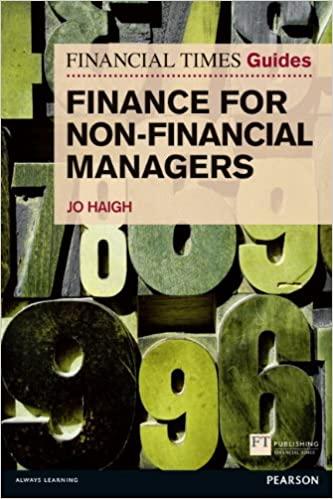Question
The following data are the returns for 1980 through 1986 on five types of capital-market instruments: common stocks, small-capitilzation stocks, long-term corporate bonds, long-term U.S.
The following data are the returns for 1980 through 1986 on five types of capital-market instruments: common stocks, small-capitilzation stocks, long-term corporate bonds, long-term U.S. government bonds, and U.S. Treasury Bills. You may wish to use a spreadsheet program to make your calculations.
| Year | Common Stock | Small Stocks | Long-term Corporate Bonds | Long-term Government Bonds | U.S. Treasury Bills |
| 1980 | 0.3242 | 0.3988 | -0.0262 | -0.0395 | 0.1124 |
| 1981 | -0.0491 | 0.1388 | -0.0096 | 0.0185 | 0.1471 |
| 1982 | 0.2141 | 0.2801 | 0.4379 | 0.4035 | 0.1054 |
| 1983 | 0.2251 | 0.3967 | 0.0470 | 0.0068 | 0.0880 |
| 1984 | 0.0627 | -0.0667 | 0.1639 | 0.1543 | 0.0985 |
| 1985 | 0.3216 | 0.2466 | 0.3090 | 0.3097 | 0.0772 |
| 1986 | 0.1847 | 0.0685 | 0.1985 | 0.2444 | 0.0616 |
For the average return problems, enter your answers in percentage format (e.g. enter 12.5% as 12.50 rather than .125)
For the holding period return problems, enter your answers as percentage values; in other words, convert your decimal format of holding period return to percentage return format (e.g. a formula result of 2.25 should be converted to 225%)
For the expected return problems, enter your answers as percentage values (e.g. enter 7.50% as 7.50 and not as 0.075)
-
Calculate the holding period return for common stocks for the 7-year holding period of 1980 through 1986.
-
Calculate the holding period return for Long Term Corporate Bonds for the 7-year holding period of 1980 through 1986.
-
Calculate the holding period return for US Treasury Bills for the 7-year holding period of 1980 through 1986.
1.Using the Average US Treasury Bill Rate as a proxy for the risk-free rate, what was the average risk premium for Small Company Common Stocks for the 7-year period?
-
Using the Average US Treasury Bill Rate as a proxy for the risk-free rate, what was the average risk premium for Long Term Corporate Bonds for the 7-year period?
Step by Step Solution
There are 3 Steps involved in it
Step: 1

Get Instant Access to Expert-Tailored Solutions
See step-by-step solutions with expert insights and AI powered tools for academic success
Step: 2

Step: 3

Ace Your Homework with AI
Get the answers you need in no time with our AI-driven, step-by-step assistance
Get Started


